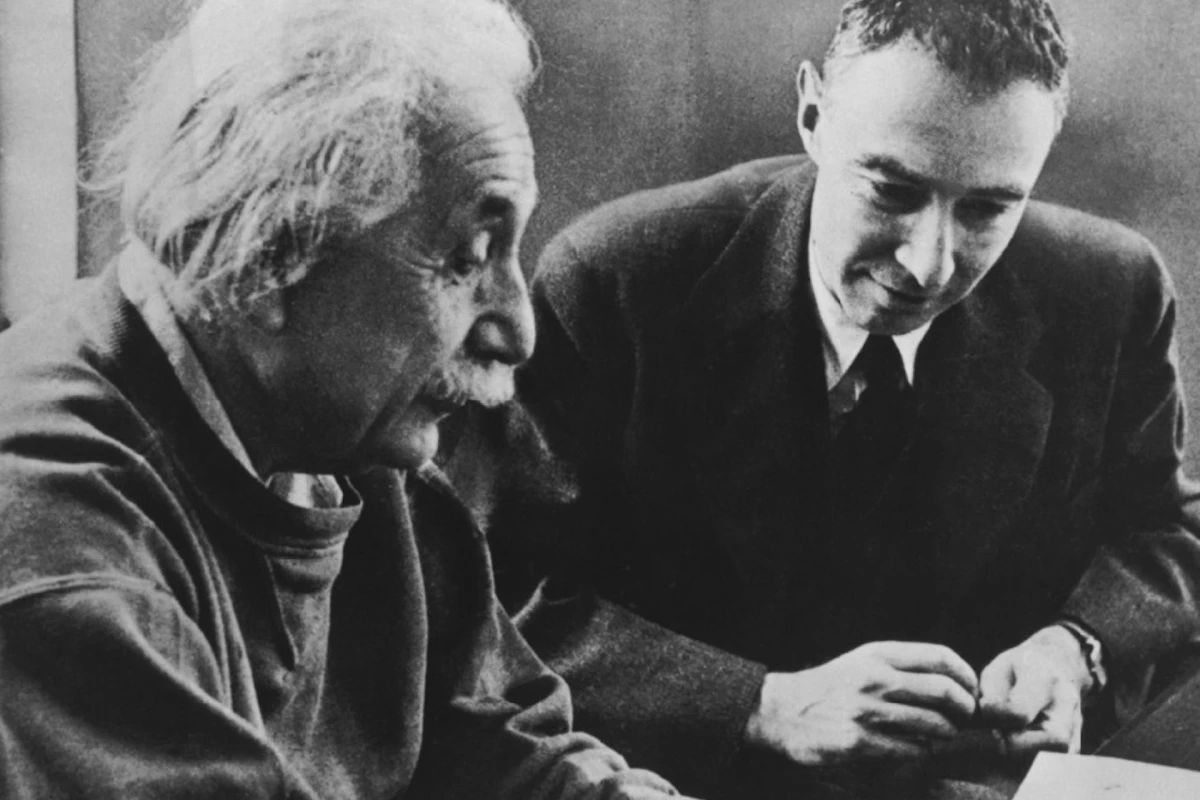Christopher Nolan’s film ‘Oppenheimer’ is based on the true story of J. Robert Oppenheimer and the Manhattan Project. Oppenheimer was an American theoretical physicist and professor of physics at the University of California, Berkeley. He is most famous for his role in leading the team of scientists who developed the first atomic bomb as part of the Manhattan Project during World War II. Oppenheimer’s story is fascinating, and Christopher Nolan does a remarkable job of bringing it to life on the big screen. The film follows Oppenheimer from his early days at Berkeley. Extending his involvement in the Manhattan Project, to his later life as a peace activist. Through it all, Oppenheimer’s dedication to his work and his passion for science remains at the center of the story.
Nolan does a masterful job of capturing the true spirit of Oppenheimer’s story. From his unwavering commitment to the Manhattan Project to his later regrets over the development of the atomic bomb. The film is a powerful reminder of the consequences of war. And also of the importance of understanding the implications of our actions. It is also a testament to the genius of Oppenheimer and the incredible team of scientists who worked on the Manhattan Project. Despite the tragedy of the atomic bomb, Oppenheimer’s story is one of courage, resilience, and hope.
So to start with…

The Christopher Nolan film ‘Oppenheimer’ tells the true story of the events that inspired the iconic director’s latest work. The film follows the real-life story of J. Robert Oppenheimer, the brilliant scientist who led the Manhattan Project and helped create the first atomic bombs. The film explores the ethical and moral implications of Oppenheimer’s work. As well as the personal toll it took on him. While the film is fictionalized, it is based on a true story and the events that inspired it.
Let’s discuss the real-life events that inspired the film, as well as the ethical and moral questions raised by Oppenheimer’s work. We’ll also explore how the film captures the spirit of Oppenheimer’s story and the impact it has had on viewers. So, let’s dive into ‘Oppenheimer’s true story and discover the real events that inspired the film.
Oppenheimer and the Creation of the Atomic Bomb

The story of J. Robert Oppenheimer and the creation of the atomic bomb is one of the most iconic stories of the twentieth century. As the head of the Manhattan Project, Oppenheimer was responsible for leading the development of the world’s first atomic bomb. Oppenheimer and his team of scientists worked tirelessly to create the weapon, and the result was a devastating explosion that changed the course of history. Oppenheimer’s work on the project has been widely praised, and he is remembered as one of the most important figures in the development of the atomic bomb.
Oppenheimer’s story is an inspiring one, and the events that led to the creation of the atomic bomb have been immortalized in Christopher Nolan’s film ‘Oppenheimer’. The film is a powerful exploration of the ethical implications of Oppenheimer’s work, and it provides a unique insight into the man behind the atomic bomb. The film is a testament to Oppenheimer’s legacy, and it serves as a reminder of the power of science and the importance of ethical decision-making.
Oppenheimer’s Role in the Manhattan Project

Real-life physicist J. Robert Oppenheimer was a key figure in the Manhattan Project. A top-secret effort to design and build the world’s first atomic bomb. Oppenheimer was a brilliant scientist and an inspiring leader, and his involvement in the project was essential to its success.
Oppenheimer was chosen to lead the Manhattan Project because of his expertise in theoretical physics and his ability to coordinate the efforts of many of the world’s leading scientists. He was responsible for overseeing the design and construction of the atomic bomb, as well as the testing and deployment of the weapon. He was also instrumental in the development of the uranium enrichment process, which was critical for producing the fissile material needed for the bomb.
Throughout the project, Oppenheimer remained dedicated to the mission of developing the atomic bomb. Despite the ethical implications of such a weapon. He was determined to ensure that the project was successful and that the bomb would be used to end the war. His leadership and dedication to the project were essential in its ultimate success. And his legacy will continue to influence future generations of scientists and engineers.
Oppenheimer’s Relationship with the U.S. Government

Oppenheimer’s relationship with the U.S. Government was complex and strained. After leading the Manhattan Project and helping the U.S. to develop the atomic bomb, he became a target of suspicion and was accused of being a communist sympathizer. Though he was ultimately cleared of all charges, the damage to his reputation was done.
The controversy around Oppenheimer’s loyalty to the U.S. Government was further fueled by the fact that his brother, Frank Oppenheimer, was a known communist. Oppenheimer’s refusal to testify against his brother in the McCarthy hearings of the 1950s only added to the distrust of the U.S. Government towards him.
Though Oppenheimer was eventually cleared of all charges, his relationship with the U.S. Government was never the same. His contributions to the Manhattan Project and his role in helping the U.S. develop the atomic bomb were widely recognized, but his legacy was forever tainted by the accusations of being a communist sympathizer.
Oppenheimer and the Aftermath of the Atomic Bomb
The atomic bomb, developed by physicist J. Robert Oppenheimer as part of the Manhattan Project, was dropped on the Japanese cities of Hiroshima and Nagasaki in August 1945. The devastating effects of the atomic bomb were felt immediately, with the destruction of both cities and the death of hundreds of thousands of people. Oppenheimer’s involvement in the Manhattan Project and subsequent decision to use the atomic bomb has been a source of debate for decades, with some arguing that it was a necessary evil in the context of the Second World War.
Oppenheimer’s role in the Manhattan Project and the atomic bomb has been the subject of much scrutiny over the years. While Oppenheimer was hailed as a hero for his work on the project, he was also criticized for his role in the development and use of the atomic bomb. Oppenheimer himself expressed regret for his involvement in the Manhattan Project and the subsequent destruction of Hiroshima and Nagasaki. In the years since the legacy of Oppenheimer and the atomic bomb has been a source of much debate and reflection.
Christopher Nolan’s Depiction of Oppenheimer

Christopher Nolan’s film ‘Oppenheimer’ is a powerful portrayal of the true story of J. Robert Oppenheimer and his involvement in the Manhattan Project. Nolan’s depiction of Oppenheimer’s journey from brilliant physicist to ‘father of the atomic bomb’ highlights the moral dilemmas of the time and the impact of Oppenheimer’s decisions on the world. Nolan’s depiction of Oppenheimer is a reflection of the man himself, a complex figure who was both praised and vilified for his role in the development of the atomic bomb. Through the film, Nolan captures the essence of Oppenheimer’s life and his part in the Manhattan Project, showing how his actions have shaped the world we live in today.
Final Words…
The story of J. Robert Oppenheimer has been told and retold over the years. He was a brilliant scientist who played a key role in the development of the atomic bomb, and his story has been immortalized in Christopher Nolan’s film ‘Oppenheimer’. Oppenheimer and his team of scientists worked tirelessly to create the atomic bomb, and their efforts were rewarded with a Nobel Prize. Oppenheimer’s relationship with the U.S. government was complicated, as he was both lauded for his work and vilified for it. After the war, Oppenheimer was ostracized for his role in the development of the atomic bomb, leading to a period of self-reflection and introspection. Christopher Nolan’s depiction of Oppenheimer is a humanizing portrait of a complex man who was both celebrated and reviled for his actions.
In a Nutshell…
Q: Who was J. Robert Oppenheimer?

A: J. Robert Oppenheimer was an American theoretical physicist and professor of physics at the University of California, Berkeley. He is best known for his role as the scientific director of the Manhattan Project, the U.S. government program that developed the atomic bomb during World War II.
Q: What was the Manhattan Project?
A: The Manhattan Project was a U.S. government program established in 1942 to develop the atomic bomb. It was led by J. Robert Oppenheimer and included some of the most renowned scientists of the time, including Enrico Fermi and Edward Teller. The project was successful in creating the first atomic bombs. Later on, they were used in 1945 against the Japanese cities of Hiroshima and Nagasaki.
Q: How did Oppenheimer contribute to the Manhattan Project?
A: Oppenheimer was the scientific director of the Manhattan Project. His contributions were essential to the success of the program. Later on, he was responsible for recruiting and managing a team of scientists, developing the theoretical basis for the atomic bomb, and overseeing the design and construction of the bombs.
Q: How did Oppenheimer’s relationship with the U.S. government change after the war?
A: After the war, Oppenheimer’s relationship with the U.S. government became strained. He became an outspoken critic of the development of the hydrogen bomb. Which lead to his security clearance being revoked in 1954.
Q: What is Christopher Nolan’s depiction of Oppenheimer?
A: Christopher Nolan’s depiction of Oppenheimer in his film “Oppenheimer” is a complex and nuanced one. He portrays Oppenheimer as a brilliant scientist, a loyal patriot, and a man with a conscience. ‘The fallen Hero’, who was deeply affected by the consequences of his work.
Q: What were the consequences of the atomic bomb?

A: The atomic bombs dropped on Hiroshima and Nagasaki in 1945 caused immense devastation and destruction. The reason behind killing hundreds of thousands of people and leading to long-term health problems for survivors. The bombings also marked a turning point in the history of warfare. And ushered in a new era of nuclear weapons and the potential for global destruction.
Q: What is the legacy of J. Robert Oppenheimer?
A: J. Robert Oppenheimer is one of the greatest scientists in history. His work on the Manhattan Project changed the course of history. He is also remembered for his moral courage and conscience. That led him to criticize the development of the hydrogen bomb. His legacy continues influencing debates about science, morality, and our responsibility to use science for good.








